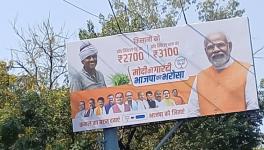"No rational basis for fuel price hike"
Surya Sethi questions the rationale for the fuel price hike recently for essential petroleum products. He explains why the logic of "rising underrecoveries" is flawed, and that the energy sector in India is not "net subsidised" as is widely reported as an excuse for the hikes and asks the government to be sensitive to the needs of poor Indians.
Rough Transcript
PP: Hello and welcome to Newsclick. Today we have with us Dr. Surya Sethi, a well known energy expert who has been Principal Advisor on energy to the Planning Commission in the past. Surya, Good to have with us.
SS: Thank you Prabir.
PP: Of course, gas and oil pries are reduced currently. What explains is the term called under-recovery. What does it really mean because government uses the term under-recovery to justify price hike for oil and other hydro carbons.
SS: First thing you must understand which is not clear at all at least to the general public is that under recovery is not a loss. It is often treated as if somebody has lost money because there is an under-recovery. Under-recovery is simply the difference between a notional price which is calculated based on formula which was crafted on the import parity price. The formula includes freight pooling, it includes import duties, it includes loss in transit and so many other things. So you get an import parity price at the point of sale and against that import parity price and the company is getting lesser than the import parity price x and the company gets x-2, 2 is the under-recovery. It is not that x-2 the company is losing money. x-2 also company may be making money. So under-recovery is a difference between a notional price which is a meaningless number and what the actual realisation is. It's not a loss. PP: If you look at this, the oil companies which is making under-recoveries which is still making profits because they all show profits in their balance sheet. SS: Not only they are making profits, in under-recoveries they themselves are paying themselves. The logic of under-recovery is if they are loosing money then how can the same government turn around and say upstream companies absorb one third of that under-recovery, downstream companies absorb one third of that under-recovery and government will pay the balance one third of the government bonds or whichever way they will pay. Originally, they were paying with government bonds recently they were saying they will not pay in cash but it has so far not happened. But very fact that people are not question is here is something called under-recovery which is touted as loss to the company and you ask the same company to absorb that under-recovery to the extent of one third to the upstream, one third to the downstream and the remaining. So the net result is that bottom line of all these is they simply don't have a clear cut policy. In paper we have an import parity pricing policy which was changed after we wanted trade parity, Rangarajan Committee said sixty percent import parity said 60 percent or 40 percent trade parity or some proportion of that. But, the moment you pass the under-recovery back to the company, it neither remains trade parity, nor import parity it's an adhoc price and the problem is that sharing of the under-recovery that's an adhoc arrangement that is decided on year to year basis. So companies don't even know exactly, what price they are going to get. ONGC has been clamouring years together they say we don't mind paying. But please tell us how much and fix it for us so we know where we stand. Just to give you a foolishness of this under-recovery which I think is very illustrative. Again my numbers may be wrong as I am speaking from memory. I remember right ONGC showed by numbers if the international price of crude oil is 60 dollars based on absorbing under-recovery, they were getting net in 57 dollars per barrel. If the crude price went to 120 dollars in the international market, because of their share of under-recovery, they will now get only 37 dollars per barrel. This is the foolishness of under-recoveries. They still make money at 37 dollars. It's not that they are loosing money. But when the crude price at international market has doubled from 60 to 120, their take per barrel has reduced from 57 dollars to 37 dollars. PP: Also is a question how 57 dollars they have arrived at. SS: That's a separate issue.
PP: Coming back to other issue the government claims that subsidies in the oil sector are hight that's why they are forced to raise the prices. But Indian diesel prices at the pump are higher than the US diesel and petrol prices. How do you explain this so called subsidy?
SS: There is no subsidy on Indian energy. If anybody tells you if Indian energy sector is subsidised they are not telling you the truth. I am talking purely the energy sector. Food is a separate issue and fertilizer is the part of the food chain. Now, if you look at the total taxes collected on the entire energy sector not only petroleum sector. I am also including the power sector because I treat the losses on the power sector which are cash losses are running somewhere between 40,000 crore to 45,000 crore. I am including that also as subsidy because the cash loss is nothing it may be theft, it may be whatever, the fact of the matter is the state electricity board looses that money, looses cash to that extent. Even if I include that, the total taxes collected on the energy sector far exceed the total subsidies. To say that there is heavy subsidy and that is causing a fiscal issue is simply not correct. The energy sector is still net contributed to your fiscal revenues rather than a drain on the fiscal revenue. A subsidy is should be a drain on your fiscal revenue. Here there is no net subsidy. Now, you may argue that you have limited means of raising taxes so you can't just give away these taxes. But, these are taxes. These are not stuff that you own. To give you a more ridiculous example, back to that under-recovery because remember ONGC, IOC these are public limited companies. Government is a share holder of this company. I can go and buy a share in this company and be a share holder. Now, the beauty of the under-recovery, the way the taxes working is that one share holder gets disproportionate amount of holding the same share because the government can dictate under-recoveries will be absorbed by which company which reduces my net profit net share but the government has gone away with that under-recoveries with fiscal revenue which is also a share holder or this company. How can a public limited company allowed to do this in this country? All share holders must be treated equally. If the government wants and this is what oil sector companies have been saying if the government wants nothing wrong, they can impose tax on the company and say that look this is a domestic resource, I am going to tax this resource, petroleum tax of so much on the ONGC. At least that is evenly applied. Today, that is not applied to a private sector entrepreneur who has no under-recoveries to pay for. He gets international price for his crude more than the international price for the gas. He is very happy. For the public sector, where is the burden. Public sector, I want to emphasise still doesn't loose money. But the fact of the matter is that, despite this kind of rigmarole of taxes and subsidies at the same time, the net result is that our prices for energy today are the highest in the world. Nobody in the world pays more for energy than Indians.
PP: Either electricity or hydrocarbon.
SS: Any form of hydrocarbon. We are paying among the highest prices in the world for any form of energy. Commercial energy I should say because traditional biomass, traditional energy is luckily outside the realm of the government so that operates from different scale from altogether. But commercial energy, there is nobody in the world who is paying either we are paying equally high or higher than anybody else. In any form of energy. To say that we are subsidizing is misleading the public.
PP: Coming back to the issue that you have raised, private owners basically the refinery companies and so on are actually getting the benefit of the major parts of the subsidy in the way it has been structured.
SS: If I was the private entrepreneur and I struck the oil for example I would get the import parity price of the oil was trading at 60 dollars a barrel, I would get 60 dollars a barrel if sold domestically. If I exported it, I would get whatever international parity price for that quality of crude is. But my public sector doesn't get that because the have to pay for these notional under-recoveries which is again because the import parity price of the same crude oil is 65 dollars but he has to pay some o the under-recoveries so he actually gets 57 dollars.
PP: Is there any justification why international prices for instance gas, KG gas is there, other gas is there and other issues are there. Is there any justification?
SS: There are two schools of thought on this. If fact, South Africa has done something very different from it. Pure economic theory is all resource must be valued at their border prices to have a efficient allocation of resources. Now, I completely subscribe to that. I have no problems with that. But that must be applied consistently across the sector. We do not do that consistently. For coal we have one policy, for oil we have another policy, for electricity we have third policy. So there are distortions within the sectors. That's one aspect. The second argument that some people are giving and which is not the merit. If I have a domestic resource why should I price that at an international price because I am not pricing the rest of my things in the domestic sector. I don't get an international salary for example. Food is not priced at international price. Why should only the energy is priced at international price? So that's a valid argument also. If you want to know my personal view, I think whether you price at international, you price it in a different manner, energy will remain it's a merit good, a life line level of access to energy is a merit good of this country. The fact that two third of the population has no access to commercial energy should be a bigger problem than how we price this. Whether we subsidise at one end, we price at other end It's a matter of you know where you want to, which is more efficient, economically more efficient. But we will need to make sure that this access is guaranteed in some form of fashion. At current prices, we are not going to give access to these prices and we are also not going to deliver the so called inclusive growth unless we provide access to commercial energy.
Get the latest reports & analysis with people's perspective on Protests, movements & deep analytical videos, discussions of the current affairs in your Telegram app. Subscribe to NewsClick's Telegram channel & get Real-Time updates on stories, as they get published on our website.
























